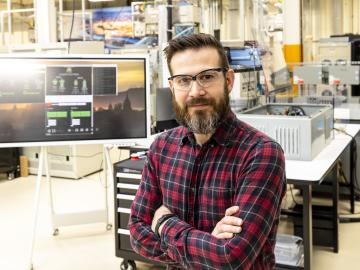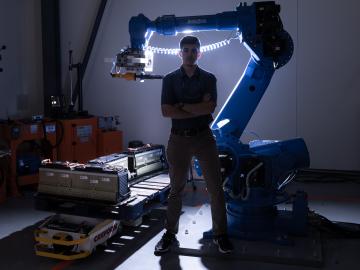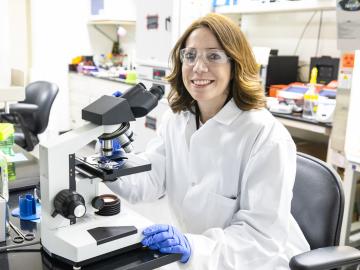
Filter News
Area of Research
News Type
News Topics
- (-) Big Data (12)
- (-) Bioenergy (23)
- (-) Biomedical (13)
- (-) Grid (7)
- (-) ITER (1)
- (-) Physics (16)
- 3-D Printing/Advanced Manufacturing (13)
- Advanced Reactors (2)
- Artificial Intelligence (9)
- Biology (27)
- Biotechnology (7)
- Buildings (10)
- Chemical Sciences (9)
- Clean Water (7)
- Composites (3)
- Computer Science (14)
- Coronavirus (6)
- Critical Materials (2)
- Cybersecurity (6)
- Energy Storage (13)
- Environment (40)
- Exascale Computing (3)
- Frontier (3)
- Fusion (9)
- High-Performance Computing (11)
- Hydropower (2)
- Isotopes (13)
- Machine Learning (10)
- Materials (9)
- Materials Science (15)
- Mathematics (5)
- Mercury (4)
- Microscopy (11)
- Nanotechnology (6)
- National Security (17)
- Neutron Science (10)
- Nuclear Energy (16)
- Partnerships (2)
- Polymers (5)
- Quantum Computing (1)
- Quantum Science (5)
- Security (7)
- Simulation (8)
- Summit (2)
- Transportation (12)
Media Contacts


While completing his undergraduate studies in the Philippines, atmospheric chemist Christian Salvador caught a glimpse of the horizon. What he saw concerned him: a thin, black line hovering above the city.

Raina Setzer knows the work she does matters. That’s because she’s already seen it from the other side. Setzer, a radiochemical processing technician in Oak Ridge National Laboratory’s Isotope Processing and Manufacturing Division, joined the lab in June 2023.

Steven Campbell can often be found deep among tall cases of power electronics, hunkered in his oversized blue lab coat, with 1500 volts of electricity flowing above his head. When interrupted in his laboratory at ORNL, Campbell will usually smile and duck his head.

Madhavi Martin brings a physicist’s tools and perspective to biological and environmental research at the Department of Energy’s Oak Ridge National Laboratory, supporting advances in bioenergy, soil carbon storage and environmental monitoring, and even helping solve a murder mystery.

After being stabilized in an ambulance as he struggled to breathe, Jonathan Harter hit a low point. It was 2020, he was very sick with COVID-19, and his job as a lab technician at ORNL was ending along with his research funding.

When reading the novel Jurassic Park as a teenager, Jerry Parks found the passages about gene sequencing and supercomputers fascinating, but never imagined he might someday pursue such futuristic-sounding science.

Climate change often comes down to how it affects water, whether it’s for drinking, electricity generation, or how flooding affects people and infrastructure. To better understand these impacts, ORNL water resources engineer Sudershan Gangrade is integrating knowledge ranging from large-scale climate projections to local meteorology and hydrology and using high-performance computing to create a holistic view of the future.

Andrea Delgado is looking for elementary particles that seem so abstract, there appears to be no obvious short-term benefit to her research.

Joanna Tannous has found the perfect organism to study to satisfy her deeply curious nature, her skills in biochemistry and genetics, and a drive to create solutions for a better world. The organism is a poorly understood life form that greatly influences its environment and is unique enough to deserve its own biological kingdom: fungi.


